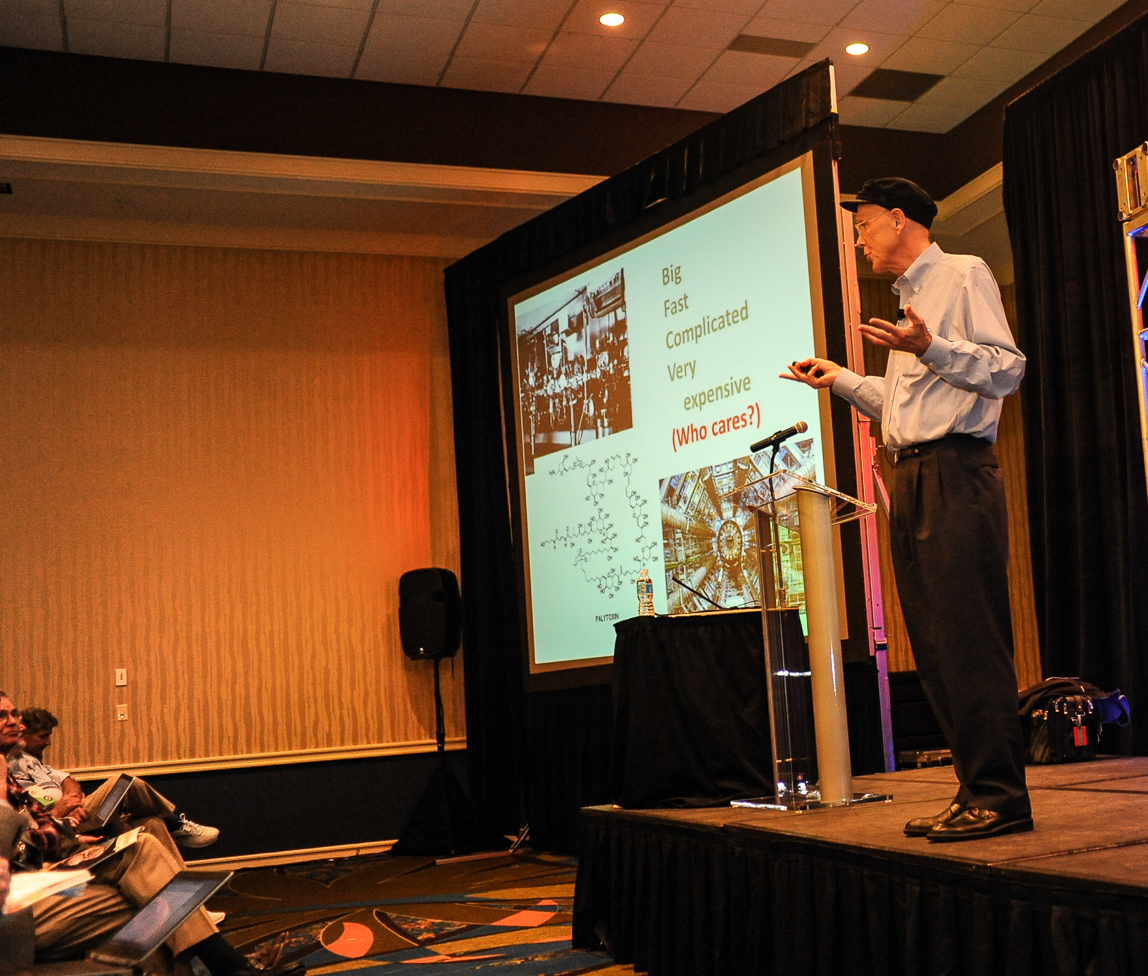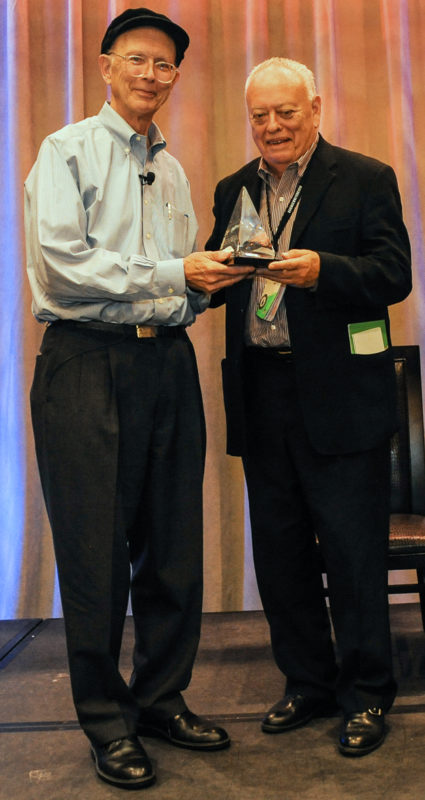
George M. Whitesides selected as first Patrusky Lecturer
Harvard chemist George M. Whitesides explains his ideas about simplicity in science during the first Patrusky Lecture on November 3, 2013. (Photo by Mark Bennington.)
Celebrated chemist and materials scientist George M. Whitesides of Harvard University was chosen to deliver the first Patrusky Lecture on November 3, 2013, at New Horizons in Science, CASW’s annual briefing on emerging research and issues in science.
Whitesides, one of the most imaginative and prolific scientists and inventors of the past century, has been the world’s most cited chemist for the past half-decade. He leads a research group whose stated goal is “to fundamentally change the paradigms of science.” Whitesides’ lecture on simplicity and surprise in science sought to peel back the layers of complexity in modern science to discern the scientific meaning of simplicity and surprise and its implications for developing new scientific methods and approaches to invention.
Delivered to science writers gathered at the University of Florida in Gainesville for ScienceWriters2013, an annual conference that combines the New Horizons science presentations with professional workshops organized by the National Association of Science Writers, Whitesides’ lively and provocative talk celebrated goal-driven science built on simplicity. Important inventions, he argued, are made by stacking technologies whose building blocks are scientific and mathematical ideas as simple as binary arithmetic: 0s and 1s.
Using elegant examples of inventions from his own lab, Whitesides argued for the value of starting with the goal of a product—a specific, valuable solution to a specific problem. For most people, having an objective does not corrupt the intellectual process,” he said. “It strengthens it.”
A recording of the lecture is available on the Patrusky Lectures video page.

Whitesides was introduced by Ben Patrusky, who recently retired as CASW’s Executive Director and was honored by the CASW Board with the creation of the Patrusky Lecture. Patrusky joined CASW President Alan Boyle in presenting an engraved crystal prism and certificate to Whitesides, who joined in festivities honoring Patrusky over the weekend meeting hosted by the University of Florida.
The Patrusky Lecture was established this spring by the CASW Board of Directors in honor of Patrusky, who managed the New Horizons program for 30 years and served as CASW’s executive director for 25 years.
The inaugural Patrusky Lecturer is among the world’s most honored and consulted scientists and inventors. At Harvard, George Whitesides is the Woodford L. and Ann A. Flowers University Professor, one of only 24 faculty members elevated to University Professor for the boundary-crossing nature of their work. He directs one of the most prolific Harvard labs ever: Whitesides and his collaborators have published just under 1,200 peer-reviewed papers and been awarded 107 patents.
About George M. Whitesides
A native of Louisville, KY, and a Harvard graduate, Whitesides earned a Ph.D. from the California Institute of Technology before joining the faculty of the Massachusetts Institute of Technology in 1963. He moved to the Harvard chemistry department in 1982, and served as chair of the department from 1986 to 1989. His research interests range widely across physical and organic chemistry and materials science, encompassing surface science, self-assembly, soft lithography, microfluidics, nanotechnology, energy production and conservation, the origin of life, and both complexity and simplicity. He has mentored more than 300 graduate students, postdocs and visiting scholars.
A lively expositor of scientific ideas who also is concerned with the public understanding of science, he has co-authored two books with the photographer Felice Frankel: On the Surface of Things: Images of the Extraordinary in Science (2008); and No Small Matter: Science on the Nanoscale (2009).
Whitesides is a member of the National Academies of Sciences and Engineering, and an honorary member of elite scientific academies and societies in the United Kingdom, France, the Netherlands and India. His dozens of science prizes include the U.S. National Medal of Science, the Kyoto Prize for Advanced Technology, the American Chemical Society’s Priestley and F. A. Cotton Medals, the Benjamin Franklin Medal in Chemistry, the Dreyfus Prize in the Chemical Science, the King Faisal International Prize for Science, and most recently the IRI Medal for technological innovation.
A tireless civic scientist and policy adviser, Whitesides has chaired the National Research Council’s Committee on Science, Engineering and Public Policy (COSEPUP),and its Board on Chemical Sciences and Technology. He also has served on several other NRC boards and committees. For the National Science Foundation, he has chaired the Chemistry Advisory Committee and Materials Research Committee as well as the Review Panel for the Materials Research Laboratories. He has been named to an additional dozen advisory committees for laboratories and institutes; been a member of the editorial boards of several publications in chemistry and materials science; and co-founded more than a dozen companies.
Also on the agenda was a presentation by George T. Whitesides, son of the renowned chemist, on the status of commercial spaceflight and exploration. George T. Whitesides, former chief of staff at NASA, is chief executive officer and president of Virgin Galactic, which has announced plans to put a passenger vehicle into space within the next few months.
Patrusky participated in the selection of George M. Whitesides to present the first annual Patrusky Lecture.
“George Whitesides does me a great honor,” Patrusky said. “Pre-eminent scientist and outstanding communicator that he is, he has also been a generous and abiding friend, mentor and guide to many a science writer, me among them. That was particularly the case during my years as New Horizons program director. Never in the countless times I reached out to him for ideas about topics and speakers did he fail to deliver leads in abundance and fresh insights to go with them. I am immensely grateful and forever indebted to him, now all the more so for his gracious acceptance of the invitation to be the first Patrusky Lecturer.”
About Ben Patrusky
CASW President Alan Boyle of NBC News Digital said that the selection of a renowned senior scientist and vivid interpreter of science for the first Patrusky Lecturer is a fitting tribute to Ben himself.
“Ben has always said one of his missions for the New Horizons briefings was to surprise even the most jaded science writers with revelations about new frontiers in research,” Boyle said. “I’m pleased to see that Dr. Whitesides’ subject for the inaugural Patrusky Lecture is ‘Simplicity, Surprise, Science,’ and I’m looking forward to all the surprises in store for November.”
Ben Patrusky embarked on his science-writing career in the early 1960s after earning a degree in electrical engineering from City College of New York and winning a science-writing fellowship at Columbia. After a dozen years as the research writer and science editor for the American Heart Association, in 1975 he embarked on a freelance science-writing career and took charge of the New Horizons in Science briefing program for CASW, becoming executive director in 1988. He has also orchestrated science journalism seminars for, among others, the National Academy of Sciences, Research to Prevent Blindness, the Kellogg Foundation, and the Ford Foundation.
Widely published and the author of two books, he is the recipient of the Science Journalism Award from the American Institute of Physics and the American Chemical Society’s Grady-Stack Award. He is an honorary member of Sigma Xi, The Scientific Research Society, and for 18 years, until 2008, served as a member of the board of trustees of Science Service (now the Society for Science and the Public), publisher of Science News and administrator of the Intel Science Talent Search. He and his wife live in New York City, where Ben is a long-time member of the board of governors of one of the nation’s oldest press clubs, The Society of the Silurians.
Former American Scientist magazine editor Rosalind Reid has assumed the combined roles of executive director and New Horizons program director that Patrusky filled for many years.